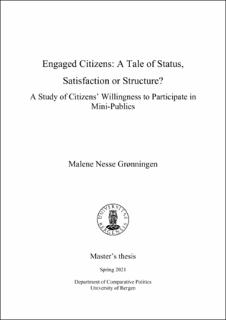| dc.description.abstract | Based on the reported participatory shift from traditional political channels to non-traditional channels, scholars are emphasising the importance of continuously developing the political channels through which individuals are able to act in order to maintain levels of political participation and political satisfaction. In 2017, Bergen municipality formed the Local Democracy Committee to investigate the need for democratic reform in the city, and despite finding stable levels of political participation, they recommended the implementation of mini-publics to ensure that the level of political participation and satisfaction is maintained. Incorporating such democratic innovations necessitates a knowledge of who wants to engage, who does not, and how they should be created to pique citizens' interests. Therefore, the aim of this thesis is to uncover the determinants of the wish to participate in mini-publics. Because there is no explicit theoretical framework for this type of participation, the study controls for internal and external levels of political efficiency as potential causes for participatory inclination in regard to mini publics, which have been heavily emphasised as important determinants in classical political participation theory. I use an OLS regression to uncover whether the traditional individual-level determinants of participation in traditional political channels are also important factors for participation in mini-publics, and data from a survey experiment is used to assess patterns of complex, multidimensional structural composition favourability in a conjoint analysis. The findings suggest that predicting the willingness to participate in mini-publics in accordance with internal levels of political efficacy may be insufficient, however, the analysis finds that younger people are more inclined to participate. The structural components of mini-publics, on the other hand, were employed as sources of external efficacy and were found to be influential predictors of the willingness to participate. Individuals were found to value financial compensation for their participation, secret votes, and to receive a formal invitation through the process of random selection. In order to further elaborate on the findings, subsequent conjoint analyses are included, analysing the relationship between the mini-publics’ potential structural composition, but also whether these preferences vary according to subgroup affiliation. | |
